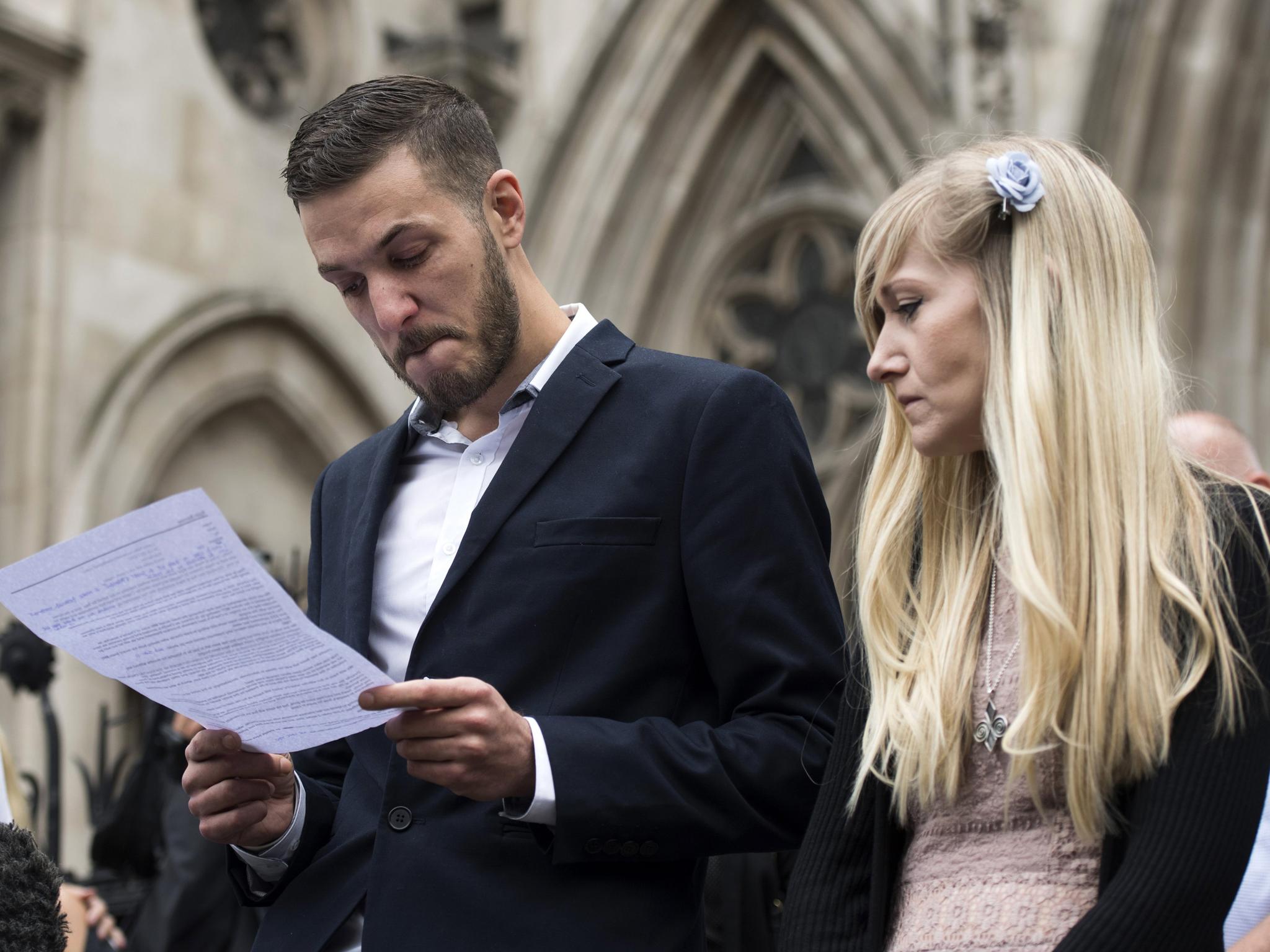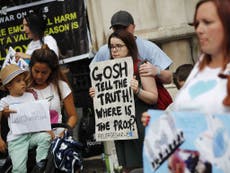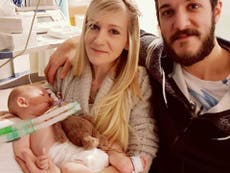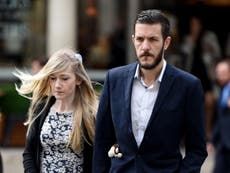The grief felt by Charlie Gard’s parents now their son is gone will be overwhelming – I know because, at its basest level, I have felt it too
My son Joshua was born prematurely and died just a day later in 2012. I’ve come to realise that every bereaved parent’s experience is different – all awful, but in truth some more awful than others


Like all parents, we expected that we would have a healthy baby and watch him grow up. Instead, after a very premature birth, we watched our son die and a few weeks later buried him in a cold cemetery. We named him Joshua.
He would have been our second child, a brother to our daughter, who was two at the time. She had been conceived after several rounds of IVF and many tears. It seemed like a miracle. When we conceived again, naturally this time, it felt even more miraculous: we had the family we had hoped for.
In January, however, a few months into the pregnancy, things started to go wrong. My wife’s waters broke early and she was rushed to hospital in Oxford, where there were facilities to cope with a very premature baby. We decided on the name Joshua in expectation that he might arrive there and then. He became real, even though in the event his arrival did not immediately follow.
Still, once waters break they are broken. We were told that a lack of amniotic fluid could affect the development of the baby’s lungs and that there was also an increased vulnerability to infections. It was unlikely the pregnancy would go to full term. Little could be done aside from hoping that delivery could be delayed as long as possible. We knew that a baby born before 24 weeks would be more likely to die than to survive and for the first fortnight we held onto that number like a comfort blanket, as if all would be well if we made it that far.
Over several weeks Antonia was in and out of various clinics, as medical professionals did their best to say reassuring things – occasionally too glibly, but always with compassionate intentions. Joshua, waiting for a shot at life, was monitored perpetually.
Snow fell. In the middle of February, after further problems, Antonia was rushed to hospital again, this time in Luton.
I was at work a week later, when I got a call to say that the doctors had decided they needed to deliver our baby immediately. He – and Antonia – had developed an infection and there would be a better chance of survival if he could be treated outside the womb. I remember very quickly writing a long email to my boss, updating him on everything I was working on - all seemingly very normal - before legging it across London to catch a train home. I then drove as fast as I could, through the wintry woods of the Chiltern hills.
An emergency caesarean under general anaesthetic is not, I would guess, the way any woman would wish to give birth. By this time, the pregnancy was nearly at 28 weeks but we knew that the presence of infection complicated matters significantly. I sat and waited, anxious and hopeful in equal measure, offered tea and sympathy by kind midwives.
After what seemed like an age a doctor came with the news that Joshua was alive and had been taken to the neonatal intensive care unit (NICU). Antonia, groggy from the anaesthetic and – as it turned out later – seriously unwell herself, was in a room not far away. It was evening by then. As I shuttled between my son and my wife I must have washed my hands with anti-bacterial gel a hundred times. Whenever I have used it since, memories of that bleak night come rushing back.
From the very beginning it was clear the outlook wasn’t great. As predicted, Joshua's lungs were not as developed as they ought to have been by that stage of gestation. More troublingly, the E coli infection had firmly set in.
It sounds daft but the thing that surprised me when I first saw my son was that he looked like a proper newborn child. I sort of supposed he would look less human, more foetal. But no, he was unexpectedly big, blue-eyed and with the same, slightly snub nose that my daughter has. His hair was dark. He was, as every parent would say of their child, beautiful and perfect – except of course that he was in an incubator, hooked up to every kind of bleeping monitor and drip machine, ventilated and heavily sedated.
I talked to him, wondering if he could hear; stroked his hand, wondering if he could feel anything. The doctors and nurses busied around us, clever people who were doing their best. I never once felt they would not give their all to save our Joshua.
At some time in the night, maybe towards 2am, I wondered whether I should drive home to check on my daughter – being looked after by her granny – and get a couple of hours sleep. I spoke to a nurse who told me she thought I should stay. Despite the obvious seriousness of the situation, that was the first time I realised that Joshua’s chances were really quite slim. I watched monitors as minutes passed, comforted by the flashing light that recorded his heartbeat.
I think it was towards dawn when the end came. I had come back into the NICU after spending a short time with Antonia. Scans of Joshua’s brain had indicated damage; the infection was spreading and was taking over his tiny body, which was unable to cope even with the aid of intravenous antibiotics.
From the outset we had been anxious to avoid putting Joshua through intense strain for no purpose – Antonia’s experience as a palliative care nurse meant she knew more than most how delayed deaths are rarely better deaths. She was wheeled into the intensive care unit in her hospital bed and we made the decision that all life support should be brought to an end. It is, of course, the most difficult thing a parent can do – then again, when you know there is no real hope, it is also the easiest. Watching your child suffering for no gain is much worse than letting them go.
The hospital chaplain was not available at such short notice but a nurse read a short baptism rite and the Lord’s prayer – a nod to my faith for which I was grateful. We said goodbyes through tears and held Joshua’s hand as drips were turned off, monitors were silenced and ventilation was removed. In no time at all, our son, so recently arrived in the world, had departed it. We spent a little while with him, comforting one another and being comforted by the hospital’s staff, who were – as hospital staff always are when a death happens – upset too.
Later, after he had been cleaned and clothed, I visited Joshua again. He looked to all the world like he was asleep and, filled with the most unbearable sorrow, I kissed his face for the last time.
Five years on and it is hard to write this. Of course, the feelings of loss become less painful and you find comfort in many people and many things; but you don’t forget – nor, in truth, would you wish to.
Once upon a time, child deaths were commonplace. In 1960 there were 22.5 infant deaths before the age of one per 1,000 live births in the UK. Today there are fewer than four. More broadly, nobody really expects their child to die before them.
In fact, though, it happens perhaps more than you might think, even in this country. And the thing I’ve come to realise is that everyone’s experience is different – all awful, but in truth some more awful than others. Compared to some parents who have grieved for their children, we were lucky. We loved Joshua but we had had no time to know him, to invest in his life. We miss him, yet we are not haunted by memories. We do not believe – as some parents do, with or without good reason – that we could have done more to protect him or to save him.
The sad, drawn-out case of Charlie Gard has made me think about Joshua often. But I would not pretend that I know how Chris Gard and Connie Yates feel now that their son has died. Their circumstances are so different, their emotions intensified by months of bitter court wrangles. Yet their grief is the grief of parents for their son and at its basest level, I have felt that. It is gut-wrenching and all-embracing.
In Berkhamsted cemetery a small, grey headstone marks Joshua’s grave. It carries a simple inscription: “Joshua James Gore. Born 22 February 2012, Died 23 February 2012. Very much loved.” At home, we have a blue box containing a tiny woolly hat and a couple of photos taken while he was alive; we show them to our daughter when she asks to see them and in time we will show them to our second son, who was born (after an incredibly nervous pregnancy) in 2015.
In my wallet, morbid though it may seem, I carry a hand-written receipt for Joshua’s tiny coffin and his funeral service – the only things I was ever able to provide for my precious boy.





Join our commenting forum
Join thought-provoking conversations, follow other Independent readers and see their replies